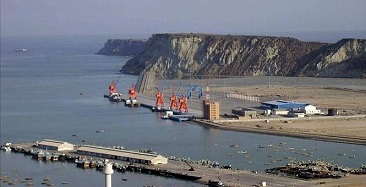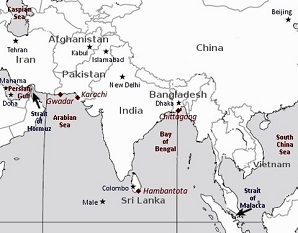Pakistan transfers strategic Gwadar port to China
On February 18, the Pakistani government transferred operational control of its strategically-located deep-sea port at Gwadar, Balochistan province to China. India, a rival of Pakistan and of China, has expressed concerns over the deal—highlighting the increasingly complex geo-political rivalries stoked by the Obama administration’s policy of “pivot” to Asia.
Gwadar is situated on the Arabian Sea, just 180 nautical miles (330 kilometres) from the Strait of Hormuz, through which a third of the world’s oil supply passes. It offers a prime location to monitor shipping passing through the Strait of Hormuz from the Persian Gulf, as well as access to cheap land routes or Middle East trade through Pakistan into western China and Central Asia.
The agreement to transfer the port to the state-owned China Overseas Port Holding Company was signed in a ceremony attended by Pakistani President Asif Ali Zardari, several ministers, and Chinese Ambassador Liu Jian. The previous operator, the Port of Singapore Authority (PSA), withdrew after Islamabad refused to provide large land allotments the PSA wanted for development work around the port.
On February 6, after Pakistan announced its decision to hand over the control of the port to China, Indian Defence Minister A.K. Antony, expressed “serious concerns” at a news conference, revealing his government’s displeasure over the deal. “In one sentence, I can say that it’s a matter of concern to us,” Antony said.
India’s External Affairs Minister Salman Khurshid said that India should not “overreact” to the agreement. However, Khurshid indicated what is at stake: “There is a delicate balance in the entire region and I think none of us should be doing something which will upset that balance.”
Downplaying India’s concerns, Pakistan foreign ministry spokesman Moazzaam Ali Khan said no “other country should have any reason to be concerned about [this agreement].” He dismissed Antony’s reaction as “unwarranted.”
Similarly, Chinese Ambassador Jian said the bilateral agreement was “in the economic interest of the people of China and Pakistan.” The Pakistani daily The Nation reported that Jian dismissed “thinking China would use this port for military purposes [as] absolutely baseless.”
However, New Delhi is suspicious about China’s presence in the Indian Ocean and sees its relations with Pakistan as a threat to India’s strategic and economic interests. This rivalry has intensified as Washington seeks to promote India as a world power in its strategy to counter China and to defend its hegemony in Asia.
The US was silent on the port transfer. However, expressing the US elite’s long standing concerns on China and the Gwadar port the New York Times wrote: “Some American strategists have described it as the westernmost link in the ‘string of pearls,’ a line of China-friendly ports stretching from mainland China to the Persian Gulf, that could ultimately ease expansion by the Chinese Navy in the region.”
Indian media and analysts wrote in the same vein that the stretch of Chinese port connections including Chittagong in Bangladesh and Hambantota in Sri Lanka together with Gwadar was part of a Chinese plan “encircling India.”
The US has also elevated India to a special status in the world nuclear regulatory regime, as a nuclear weapons state and non-signatory of the Nuclear Non-Proliferation Treaty. This luxury was denied to Washington’s long-time ally, Pakistan.
The US “pivot” presents Pakistan with a geo-political dilemma: it has depended on the US and China since the mid-1960s. Pakistan responded to the strengthening of its arch-rival India’s ties with the US by strengthening its ties with China. However, such moves by Islamabad would cut across its relations with Washington, upon which the Pakistani bourgeoisie traditionally relied to base its class rule.
The Pakistan People’s Party-led government signed the Gwadar agreement with China even though Pakistan’s former military dictator, Pervez Musharraf, opted in 2007 for the PSA not to upset Washington. Musharraf did this even though China provided 75 percent of the $US250 million cost of construction.
Soon after the US raid killing Osama Bin Laden in the Pakistani city of Abbottabad, Pakistan offered the port to China in May, 2011. Though China reportedly turned down the offer, then-Defence Minister Ahmad Mukhtar also offered to build a naval base in Gwadar for the Chinese.
The US’ growing global rivalry with China has become caught up with Pakistan-India tensions and is intensifying them. The “comprehensive peace dialogue” between them has effectively been suspended since November 2008. Last month, deadly clashes erupted over the Line of Control in the disputed Kashmir region.
For China, the port agreement provides vast potential benefits. Lin Boqiang, director of Energy Economics Research centre at Xiamen University, explained: “I do believe China will build the port at the astonishing ‘Chinese speed’ to materialise the port’s strategic values.” Gwadar offers a shorter route to western China—via the recently expanded Karakoram highway across Gilgit-Baltistan in northern Pakistan—and an alternative route to vulnerable sea lanes through the Strait of Malacca.
Sixty percent of oil imports to China come from the Persian Gulf while 80 percent of total oil imports have to cross the Strait of Malacca before reaching the mainland—putting China, the world’s biggest energy consumer, in significant jeopardy from the threat of a US Navy blockade of the Strait of Malacca.
The race to secure energy supply routes by China and India is driving a naval arms race for so-called “blue-water navy” capabilities. The US backs India’s projection of its naval power in the Indian Ocean and encourages it to be assertive in the region.
India has joined the US in cutting across Chinese interests in the South China Sea under the guise of “freedom of navigation.” Referring to Chinese opposition to joint Indian oil exploration with Vietnam in the South China Sea, Indian Naval Chief Admiral D.K. Joshi warned last December that when the “country’s interests [are] at stake, we will be required to go there and we are prepared for that.”
Attempts were made later to downplay the significance of the comment, but it underscores the hair-trigger military tensions building up in Asia. These tensions include the deep internal conflicts within Pakistan itself.
Gwadar is located in politically volatile Baluchistan Province, which has poor infrastructure and is gripped with the insurgency of separatist Baluchi nationalist groups. These groups are fighting the Pakistani military and demanding autonomy. Some have appealed to Washington for support and have opposed China’s building of the port at Gwadar.
The US has refused Pakistani requests for the Baluchi insurgents to be placed on a list of terrorist organizations. Sections of the US political establishment have even raised the possibility of supporting “Baluchi self-determination” to warn Islamabad not to tie itself too closely to Beijing.
___________________________________________________________________________________
Article published here: http://www.wsws.org/en/articles/2013/02/26/gwad-f26.html
URL: http://www.a-w-i-p.com/index.php/2013/02/26/pakistan-transfers-strategic-gwadar-port


























